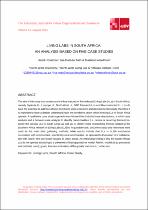JavaScript is disabled for your browser. Some features of this site may not work without it.
- ResearchSpace
- →
- Research Publications/Outputs
- →
- Journal Articles
- →
- View Item
| dc.contributor.author |
Coetzee, H

|
|
| dc.contributor.author |
Du Toit, I-M

|
|
| dc.contributor.author |
Herselman, Martha E

|
|
| dc.date.accessioned | 2012-09-06T10:16:32Z | |
| dc.date.available | 2012-09-06T10:16:32Z | |
| dc.date.issued | 2012-08 | |
| dc.identifier.citation | Coetzee, H, Du Toit, I-M and Herselman, M. 2012. Living Labs in South Africa: An analysis based on five case studies. eJOV: The Electronic Journal for Virtual Organizations and Networks, vol. 14, 29pp | en_US |
| dc.identifier.issn | 1442-9331 | |
| dc.identifier.uri | http://hdl.handle.net/10204/6082 | |
| dc.description | Copyright: © 2012 eJOV. This is an open-access article distributed under the terms of the Creative Commons Attribution License (http://creativecommons.org/licenses/by-nd/3.0/), which permits unrestricted use and distribution, in any medium, provided the original author and source are credited, and prohibits derivatives. | en_US |
| dc.description.abstract | The aim of this study is to understand the key features of five selected Living Labs (LLs) in South Africa, namely Siyakula LL, Limpopo LL, North-West LL, SAP Research LLs and Reconstructed LL. LLs do have the potential to address Africa’s immanent socio-economic and developmental needs, therefore it is important to have a deeper understanding of the conditions under which existing LLs in South Africa operate. A qualitative case study approach was followed that included case descriptions, a within-case analysis and a between-case analysis to identify commonalities (i.e. central or recurring themes) between the various LLs in South Africa as well as to identify more overarching themes related to the Southern Africa network of Living Labs (LLiSA). A questionnaire, document study and interviews were used as the main data gathering methods. Main results include that LLs in LLiSA emphasize co-creation with communities, specifically rural communities, as opposed to European LLs’ collaboration with ‘users’ who are mostly located in urban areas. An interesting finding is that the South African LLs do not operate according to a preferred or fixed approach or model. Rather, models (e.g. processes and methods used), goals, theories and values differ greatly from one LL to the next. | en_US |
| dc.language.iso | en | en_US |
| dc.publisher | Dr. Pascal Sieber & Partners AG | en_US |
| dc.relation.ispartofseries | Workflow;9503 | |
| dc.subject | Living Labs | en_US |
| dc.subject | South African Living Labs | en_US |
| dc.subject | Virtual organizations | en_US |
| dc.title | Living Labs in South Africa: An analysis based on five case studies | en_US |
| dc.type | Article | en_US |
| dc.identifier.apacitation | Coetzee, H., Du Toit, I., & Herselman, M. E. (2012). Living Labs in South Africa: An analysis based on five case studies. http://hdl.handle.net/10204/6082 | en_ZA |
| dc.identifier.chicagocitation | Coetzee, H, I-M Du Toit, and Martha E Herselman "Living Labs in South Africa: An analysis based on five case studies." (2012) http://hdl.handle.net/10204/6082 | en_ZA |
| dc.identifier.vancouvercitation | Coetzee H, Du Toit I, Herselman ME. Living Labs in South Africa: An analysis based on five case studies. 2012; http://hdl.handle.net/10204/6082. | en_ZA |
| dc.identifier.ris | TY - Article AU - Coetzee, H AU - Du Toit, I-M AU - Herselman, Martha E AB - The aim of this study is to understand the key features of five selected Living Labs (LLs) in South Africa, namely Siyakula LL, Limpopo LL, North-West LL, SAP Research LLs and Reconstructed LL. LLs do have the potential to address Africa’s immanent socio-economic and developmental needs, therefore it is important to have a deeper understanding of the conditions under which existing LLs in South Africa operate. A qualitative case study approach was followed that included case descriptions, a within-case analysis and a between-case analysis to identify commonalities (i.e. central or recurring themes) between the various LLs in South Africa as well as to identify more overarching themes related to the Southern Africa network of Living Labs (LLiSA). A questionnaire, document study and interviews were used as the main data gathering methods. Main results include that LLs in LLiSA emphasize co-creation with communities, specifically rural communities, as opposed to European LLs’ collaboration with ‘users’ who are mostly located in urban areas. An interesting finding is that the South African LLs do not operate according to a preferred or fixed approach or model. Rather, models (e.g. processes and methods used), goals, theories and values differ greatly from one LL to the next. DA - 2012-08 DB - ResearchSpace DP - CSIR KW - Living Labs KW - South African Living Labs KW - Virtual organizations LK - https://researchspace.csir.co.za PY - 2012 SM - 1442-9331 T1 - Living Labs in South Africa: An analysis based on five case studies TI - Living Labs in South Africa: An analysis based on five case studies UR - http://hdl.handle.net/10204/6082 ER - | en_ZA |






